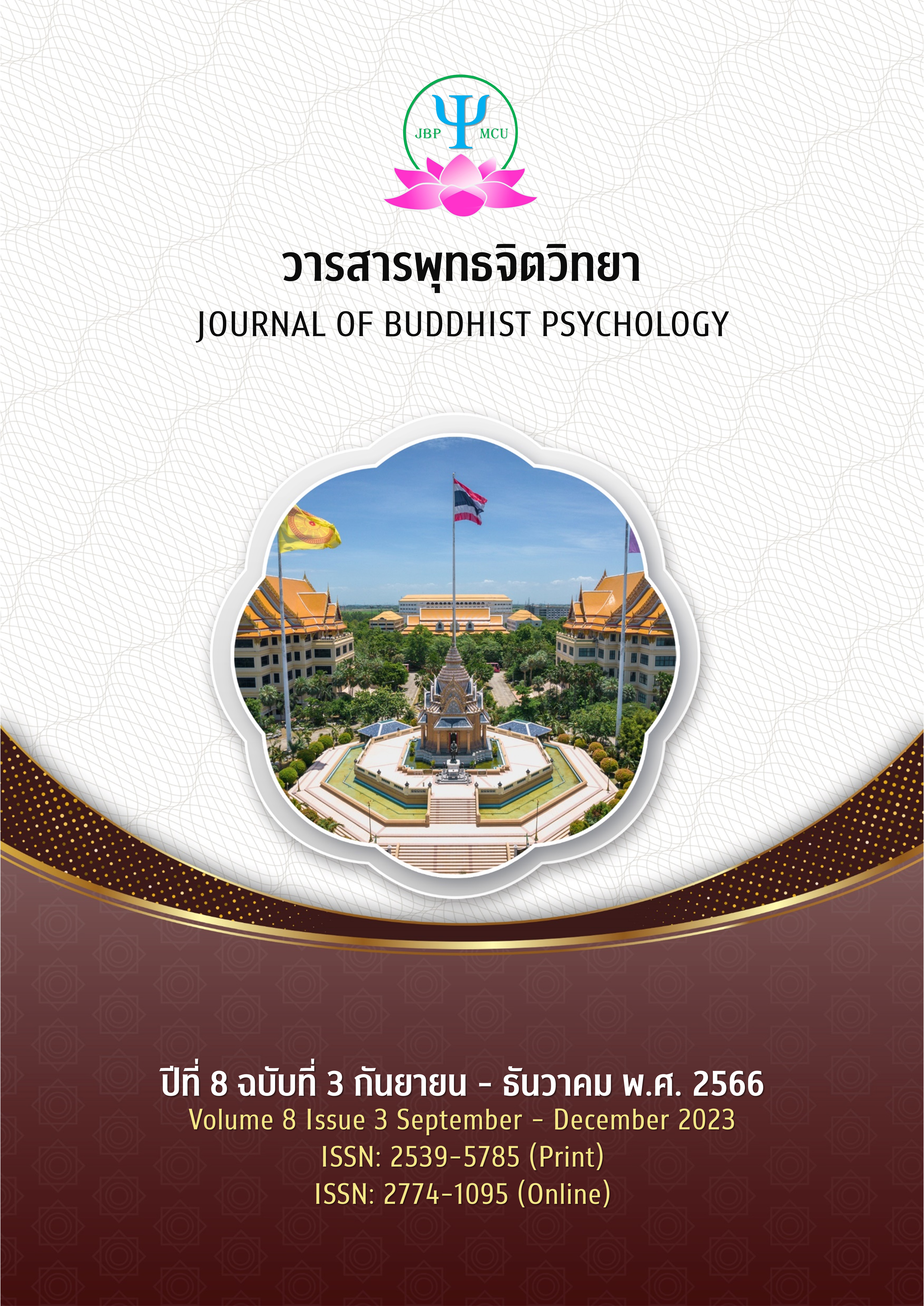โมเดลสมการโครงสร้างพลังศักยภาพแห่งตนในการส่งเสริม พลังความคิดเชิงบวกตามแนวพุทธจิตวิทยาของพนักงานธุรกิจยานยนต์
Main Article Content
บทคัดย่อ
การวิจัยแบบผสานวิธีครั้งนี้ มีวัตถุประสงค์เพื่อ 1) ศึกษาองค์ประกอบการสร้างพลังศักยภาพแห่งตนในการส่งเสริมพลังความคิดเชิงบวกของพนักงานธุรกิจยานยนต์ตามหลักพุทธธรรมและทฤษฎีจิตวิทยา 2) พัฒนาและตรวจสอบโมเดลสมการโครงสร้างพลังศักยภาพแห่งตนในการส่งเสริมพลังความคิดเชิงบวกตามแนวพุทธจิตวิทยาของพนักงานบริษัทธุรกิจยานยนต์ 3) นำเสนอโมเดลสมการโครงสร้างพลังศักยภาพแห่งตนในการส่งเสริมพลังความคิดเชิงบวกตามแนวพุทธจิตวิทยาของพนักงานธุรกิจยานยนต์ เครื่องมือที่ใช้ในการวิจัย ได้แก่ การวิจัยเชิงคุณภาพใช้การสัมภาษณ์เชิงลึกเแบบเฉพาะเจาะจงจำนวน 19 รูป/ท่าน และการสนทนากลุ่มผู้ทรงคุณวุฒิ 9 ท่าน การวิจัยเชิงปริมาณใช้แบบสอบถามกับกลุ่มตัวอย่างเป็นพนักงานธุรกิจยานยนต์จำนวน 458 คน การวิเคราะห์เชิงปริมาณใช้สถิติแบบบรรยายและวิเคราะห์ด้วยโปรแกรม LISREL เพื่อตรวจสอบความสอดคล้องของโมเดลกับข้อมูลเชิงประจักษ์ ผลการวิจัย พบว่า โมเดลสมการโครงสร้างที่พัฒนาขึ้นมีความสอดคล้องกับข้อมูลเชิงประจักษ์ พิจารณาจาก ค่าไค-สแควร์ c 2 = 0.29 , df = 4 , c 2 /df= 0.25 ,p-value = 0.99, GFI= 1.000, AGFI= 0.997, RMR= 0.0123, RMSEA= 0.086 ผ่านเกณฑ์ทุกตัว พลังศักยภาพแห่งตน ปัจจัยส่งเสริมคุณลักษณะของพนักงาน และ ปัจจัยแวดล้อมพลังศักยภาพทางใจ สามารถร่วมกันอธิบายความแปรปวนของพลังความคิดเชิงบวกได้ถึงร้อยละ 97.20 ทั้งปัจจัยส่งเสริมคุณลักษณะและปัจจัยแวดล้อมเป็นตัวแปรส่งผ่านที่ดี ดังนั้นจึงสามารถสรุปได้เป็น METTATRON+ MODEL ซึ่งเป็นการส่งเสริมพลังทางจิตใจจากหลักธรรมพละ 5 สู่พลังความคิดเชิงบวก
มีแนวทางการรักษาพลังความคิดบวกอย่างยั่งยืน คือ PLUS เป็นการสร้างดุลยภาพทางความคิด ทั้งคิดบวกและการรู้จักหยุดคิดด้วยจิตว่าง
Article Details

อนุญาตภายใต้เงื่อนไข Creative Commons Attribution-NonCommercial-NoDerivatives 4.0 International License.
เอกสารอ้างอิง
ชัยนรินท์ ธีรไชยพัฒน์ และคณะ. (2559). การศึกษารูปแบบความสัมพันธ์เชิงสาเหตุระหว่าง พละ 5 และพฤติกรรมด้านคุณธรรมในมิติของสังคหวัตถุ 4 ของผู้ปฏิบัติกรรมฐานในพุทธศาสนาเถรวาท และความสามารถเชิงปัญญาของผู้นำเชิงกลยุทธ์ในธุรกิจธนาคารพาณิชย์ไทย. วารสารพฤติกรรมศาสตร์เพื่อการพัฒนา, 8(1),1-20.
ธีรพัฒน์ วงศ์คุ้มสิน. (2561). ทุนทางจิตวิทยาเชิงบวก ความผาสุกทางจิตใจและความยึดมั่น ผูกพันในวิชาชีพของข้าราชการครู สังกัดโรงเรียน ในเขตกรุงเทพมหานคร. วารสารสังคมศาสตร์และมนุษยศาสตร์, 44(2), 211-248.
ประทีป พืชทองหลาง และญาตาวีมินทร์ พืชทองหลาง. (2561). กัลยาณมิตร: เพื่อนแท้บนเส้นทางแห่งอริยมรรค.วารสาร มจร พุทธปัญญาปริทรรศน์, 3(2), 118-137.
ฝ่ายแรงงาน คณะผู้แทนถาวรไทยประจำสหประชาชาติ ณ นครเจนีวา.(2564). ผลกระทบจากโควิด-19 ที่มีต่ออุตสาหกรรมยานยนต์. สืบค้นเมื่อ 21 ธันวาคม 2566, จาก https://www.ilo.org/wcmsp5/ groups/public/—ed_dialogue/sector/documents/briefingnote/wcms_741343.pdf
มหาจุฬาลงกรณราชวิทยาลัย. (2539). พระไตรปิฎกภาษาไทย ฉบับมหาจุฬาลงกรณราชวิทยาลัย. กรุงเทพฯ: มหาจุฬาลงกรณราชวิทยาลัย.
มหามกุฏราชวิทยาลัย. (2558). พระไตรปิฎกและอรรถกถาแปล. นครปฐม: มหามกุฏราชวิทยาลัย.
สกล เหลืองไพฑูรย์, สุเชาวน์ พลอยชุม. (2561). การเสริมสร้างความคิดเชิงบวกตามแนวพุทธธรรม. วารสารมหาจุฬาวิชาการ, 6 (ฉบับพิเศษ), 113-123.
สำนักงานสถิติแห่งชาติกระทรวงดิจิทัลเพื่อเศรษฐกิจและสังคม. (2563). สรุปผลที่สำคัญการสำรวจสุขภาพจิต (ความสุข) ของคนในประเทศไทย พ.ศ. 2563. สืบค้นเมื่อ 21 ธันวาคม 2566, จากhttps://www.nso.go.th/ sites/2014/DocLib13//2563/190864_11.pdf
อภินันท์ อุ่นทินกร. (2563). ค่ายรถไทย ปรับตัวสู้ COVID-19 เน้นขายผ่านออนไลน์. สืบค้นเมื่อ 22 กุมภาพันธ์ 2565, จาก https://www.autoinfo.co.th/online/322368/
อรอุมา รัตนบรรณกิจ. (2564). ผลกระทบทางด้านสุขภาพจิตจากวิกฤตการระบาดของโรคอุบัติใหม่ โควิด-19. สืบค้นเมื่อ 13 ธันวาคม 2565, จาก https://www.senate.go.th/document/Ext26534/26534832 _0002.PDF
Benjapolpitak, A. (2021). Open the results of the thai people's heart during COVID-19 Meet the Big. Retrieved November 6, 2021, from https://www.bangkokbiznews.com/social/965010
Hulsheger UR, Alberts HJ, Feinholdt A, & Lang JW. (2013). Benefits of mindfulness at work: The role of mindfulness in emotion regulation, emotional exhaustion, and job satisfaction. J Appl Psychol, 98(2),310-25.
Luthans, F., Avolio, B. J., Avey, J. B., & Norman, S. M. (2007). Positive Psychological Capital: Measurement and Relationship with Performance and Satisfaction. Personnel Psychology, 60, 541-572.
Peuchthonglang, P & Peuchthonglang, Y. (2018). The True friends: Noble Friends on the Path of the Enlightenment. Journal of MCU Buddhapanya Review, 3 (2), 119-137.
Snyder, C. R., & Lopez, S. J. (2002). Handbook of positive psychology. New York: Oxford University Press.
Van Schrojenstein Lantman, M., Mackus, M., Otten, LS., de Kruijff D, van de Loo AJAE, Kraneveld AD, Garssen J, Verster JC. (2017). Mental resilience perceived immune functioning, and health. Journal of Multidisciplinary Healthcare, 10, 107-112.
Youssef, C. M., & Luthans, F. (2007). Positive Organizational Behavior in the Workplace: The Impact of Hope, Optimism, and Resilience. Journal of Management, 33(5), 774-800.


